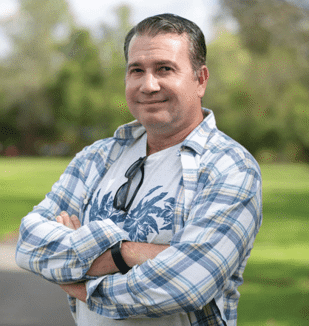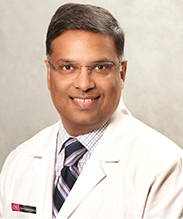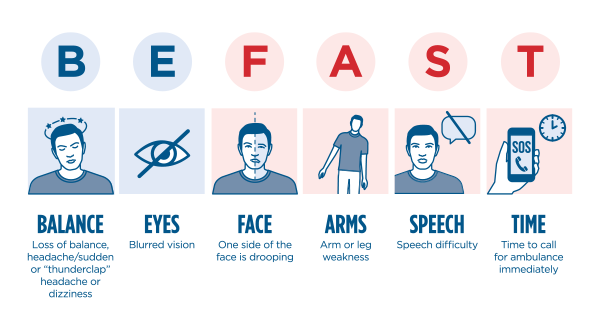"From the ED to rehab, everyone at RWJUH Somerset was very attentive. They helped me in any way I needed."

Anthony Maceiko of Bridgewater had two headaches to deal with when he woke up on February 1, 2021. The first was two feet of snow that the 48-year-old mechanical engineer had to clear. The second was an actual headache. He’d had it the night before, and still had it despite a night’s rest.
Heading to the garage for his snowblower, something strange happened. “I was putting on boots and felt drool coming out the side of my mouth,” he says. “In the mirror, the right side of my face was sagging.” Having had firstaid training, “I knew these were signs of a stroke,” he says.
His voice slurred as he rushed inside to his wife. “Call 911 right now,” he said. The ambulance that quickly arrived whisked Anthony to a hospital nationally recognized for stroke care: Robert Wood Johnson University Hospital (RWJUH) Somerset, which is certified as a Primary Stroke Center by the Joint Commission and the New Jersey Department of Health and Senior Services, and was recently recognized as “high-performing” in the care of stroke patients by U.S. News & World Report.
The hospital had been alerted that Anthony was on his way, and an expert team sprang into action as soon as he arrived.

“We have a program where if we suspect a patient with a stroke is coming in, we have them quickly assessed by the Emergency Department [ED] doctor,” says neurologist Srinivasa Potluri, MD, Medical Director of RWJUH Somerset’s stroke program and a member of RWJBarnabas Health Medical Group. “If there are significant symptoms, we rush the patient directly to a CAT scan to look at the brain and exclude a brain hemorrhage. If possible, we also look at blood vessels leading to the brain to see if there are any blockages.”
Doctors ruled out a hemorrhage, and Anthony, whose right hand had now grown weak, was quickly given tissue plasminogen activator, an intravenous medication. Known as tPA, the drug helps dissolve blood clots that cause strokes.
Such swift action is essential to limiting stroke damage. “Our approach is that ‘time is brain,’” Dr. Potluri says. “Our acute stroke treatment protocols have been incredibly effective in allowing us to reduce the amount of time to administer tPA from when the patient arrives.” Anthony would, in fact, set an RWJUH Somerset record for the year: It had taken a mere 33 minutes to assess and treat him.
Testing revealed Anthony had suffered a tear in one of two carotid arteries that supply blood to the brain. This had made his body form blood clots that in turn interfered with the flow of blood to his brain, triggering the stroke.
Anthony quickly began feeling more like himself. “I was improving by the hour,” he says. Speech took longer to recover than hand mobility, but everything was getting better. “Getting clot-busting medication helped with recovery,” he says.
Steady Improvement
After four days in the hospital, Anthony went home and continued improving. “In a week or so, my face stopped sagging and my speech was getting even better,” he says. “I was back to work in two weeks.” People he spoke with on the phone couldn’t detect any slurring, he says.
With therapy at RWJUH Somerset, Anthony’s hand strength and speech continued to improve. “We conveniently have a physical therapy gym on the neuroscience floor,” Dr. Potluri says. “The goal is to have patients seen by rehabilitation services providers such as speech therapists, physical therapists and occupational therapists, usually the same day.”
The hospital also offers services for emotional needs, including a monthly stroke support group. “It’s helpful for patients and families to learn from each other, see what services are available and cope with any long-lasting symptoms of stroke,” Dr. Potluri says.
Anthony continues to see Dr. Potluri regularly and will never forget the outstanding care he received. “From the ED to rehab, everyone at RWJUH Somerset was very attentive,” he says. “They helped me in any way I needed.”
Be Fast to Recognize Signs of StrokePrompt treatment of a stroke is critical. The acronym BE FAST can help you remember red flags that may indicate you’re having one. Balance—Are you having issues such as dizziness, unsteadiness or poor coordination? Eyesight—Do you suddenly have double vision, vision loss or other visual problems? Face—Does it droop or seem uneven when you smile? Arms—Are one or both of your arms or legs suddenly numb, paralyzed or weak? Speech—Are you slurring words, not comprehending or having other difficulty communicating? Time—to call 911. Don’t take your own vehicle to the hospital: Ambulances can call ahead and make sure the stroke team is prepared to meet and treat you right away.
|
Salutes for Stroke CareRobert Wood Johnson University Hospital (RWJUH) Somerset has been recognized for outstanding stroke care even beyond being designated a Primary Stroke Center by the Joint Commission and the New Jersey Department of Health and Senior Services and being recognized as “high-performing” for care of stroke patients by U.S. News & World Report. In September, the hospital received the American Heart Association’s (AHA’s) Gold Plus Get with the Guidelines—Stroke Quality Achievement Award for its commitment to ensuring stroke patients receive the most appropriate treatment according to nationally recognized, research-based guidelines. RWJUH Somerset also received the AHA’s Target: Stroke Honor Roll award, recognizing the hospital’s quality measures to reduce time between a patient’s arrival and treatment with clot-busting medication. In a third honor, the AHA gave the hospital its Target: Type 2 Diabetes award. To qualify, hospitals must meet quality measures developed with more than 90 percent of compliance for 12 consecutive months for the “Overall Diabetes Cardiovascular Initiative Composite Score.” |
Whoever your heart beats for, our hearts beat for you. Learn more about heart and vascular care at RWJUH Somerset. To connect with a top cardiovascular specialist at RWJUH Somerset, call 888-724-7123.
